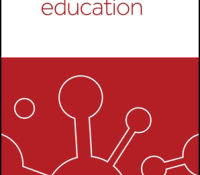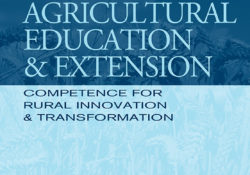eric.ed.gov har udgivet: This paper explores two foundation phase teachers’ example spaces (a space in the mind where examples exist) when teaching number-related topics in relation to snapshots of their content knowledge (CK). Data was collected during a pilot primary maths for teaching course that included assessments of teacher content knowledge (CK). An analysis of a content-knowledge focused pre-test developed for the larger study indicated a relatively high score for one teacher and a low score for the other. Using Rowland’s (2008) framework, an analysis of classroom practice showed associations between a higher CK and the extent of a teacher’s example space and more coherent connections between different representational forms. Although no hard claims or generalisations of the link between teachers’ example spaces and their level of mathematics content knowledge… Continue Reading →
Like this:
Like Loading...
eric.ed.gov har udgivet: School districts and states across the Regional Educational Laboratory Mid-Atlantic Region and the country as a whole have been modifying their teacher evaluation systems to identify more effective and less effective teachers and provide better feedback to improve instructional practice. The new systems typically include components related to student achievement growth and instruments for observing and rating instructional practice. Many school districts and states are considering adopting commercially available instruments for the instructional practice component of their evaluation systems. Yet little data are available to help districts and states choose among available instruments or determine which dimensions of instructional practice merit the greatest emphasis. Most existing data comparing different observation instruments, including their statistical characteristics and their relationship to student achievement, come from the Bill & Melinda… Continue Reading →
Like this:
Like Loading...
eric.ed.gov har udgivet: This study examined uses of adolescent literature included secondary teacher preparation in English, math, science, and social studies education at 12 institutions. Analyses revealed programs emphasized adolescent literature in a variety of ways and most often in courses for English majors. Only two institutions required that prospective math, science, and social studies teachers take literacy courses. References to adolescent literature in syllabi other than English/literacy education courses were almost nonexistent. Adolescent literature was primarily used (a) to ensure knowledge of texts, (b) to address issues of diversity in the classroom, and (c) as a means of effective classroom instruction. (Contains 1 table.) Link til kilde
Like this:
Like Loading...
tandfonline.com har udgivet en rapport under søgningen “Teacher Education Mathematics”: Abstract Abstract Afterschool interventions in STEM are linked to learning gains during the school day. These opportunities engage and excite students about STEM concepts since they observe a more hands-on, project-oriented approach. Often these opportunities for afterschool interventions are infrequent in nature and leave gaps for students in their maturation and understanding. Herein we describe the first report of an afterschool intervention, named NE STEM 4U, targeting socioeconomically disadvantaged middle school youth via a twice weekly, year-long intervention, studied across two years. We assessed the impact of this program on i.) short-term, individual student gains in STEM content knowledge and ii.) delivery of the program in terms of appropriateness for age group and content using the DoS observation tool. We… Continue Reading →
Like this:
Like Loading...
tandfonline.com har udgivet en rapport under søgningen “Teacher Education Mathematics”: ABSTRACT ABSTRACT This Special Issue aims to present evidence about the relationships between content knowledge (CK), pedagogical knowledge (PK) and pedagogical content knowledge (PCK); the development of these types of knowledge in novice and experienced secondary science teachers; and how CK, PK and/or PCK impact students’ learning. Since Shulman’s introduction of PCK as the feature that distinguishes the teacher from the content expert, researchers have attempted to understand, delineate, assess and/or develop the construct in pre- and in-service teachers. Accordingly, empirical findings are presented that permit further discussion. Outcomes permit post-hoc examination of a recent, collectively described, ‘consensus’ model of PCK, identifying strengths and potential issues. As we will illustrate, the relationship between CK, PK and PCK is central to… Continue Reading →
Like this:
Like Loading...
eric.ed.gov har udgivet: Educators today must be able to respond to the needs of an increasingly diverse student body and to teach all students the knowledge, skills, and attitudes needed for civic participation in a globalized, pluralist society. While state departments of education and national teacher organizations have begun to adopt global awareness in their teaching standards and evaluation tools, educators need to understand what globally competent teachers actually do in classrooms across subject areas and grade levels. This qualitative, multiple case study explores the signature pedagogies (Shulman, 2005) of 10 in-service teachers in one southeastern state who teach for global competence in math, music, science, English, social studies, and language classes across elementary, middle, and high schools. We found three signature pedagogies that characterized globally competent teaching practices across… Continue Reading →
Like this:
Like Loading...
tandfonline.com har udgivet en rapport under søgningen “Teacher Education Mathematics”: ABSTRACT Formulae display:?Mathematical formulae have been encoded as MathML and are displayed in this HTML version using MathJax in order to improve their display. Uncheck the box to turn MathJax off. This feature requires Javascript. Click on a formula to zoom. ABSTRACT The structure and definition of professional knowledge is a continuing focus of science education research. In 2012, a pedagogical content knowledge (PCK) summit was held and it suggested a model of professional knowledge and skill including PCK, which was later often called the Consensus Model (Gess-Newsome, 2015. A model of teacher professional knowledge and skill including PCK: Results of the thinking from the PCK summit. In A. Berry, P. J. Friedrichsen, & J. Loughran (Eds.), Teaching and learning in science series. Re-examining… Continue Reading →
Like this:
Like Loading...
tandfonline.com har udgivet en rapport under søgningen “Teacher Education Mathematics”: Link til kilde
Like this:
Like Loading...
eric.ed.gov har udgivet: This paper outlines a University-School District partnership with the intent to increase the number of middle grades mathematics and science teachers. This externally funded initiative includes onsite, authentically situated professional development for pre- and in-service teachers at three different urban, low-socioeconomic schools with a majority Hispanic population of students. Program objectives include increasing mathematics and science content knowledge, increasing self-efficacy in teaching math and science, building and incorporating a success-driven school culture and infrastructure to increase student performance in a well-articulated, scalable and transformable model. Program components include site based common planning times, STEM Thursdays where science and mathematics lessons are practiced and refined, authentic summer research opportunities for pre- and in-service teachers to work with scientists and university faculty, teacher certification workshops and a mentoring model… Continue Reading →
Like this:
Like Loading...
tandfonline.com har udgivet en rapport under søgningen “Teacher Education Mathematics”: Systemic Design, from the content to the structure of education: new educational model. Link til kilde
Like this:
Like Loading...




